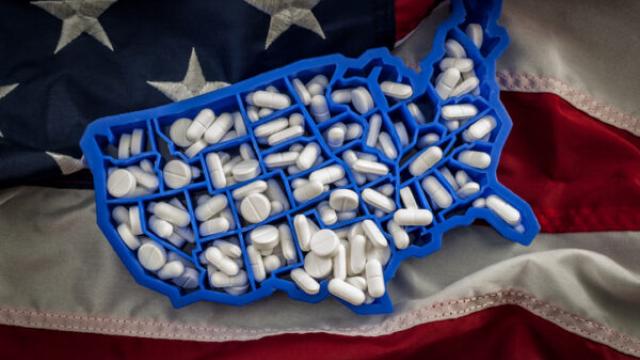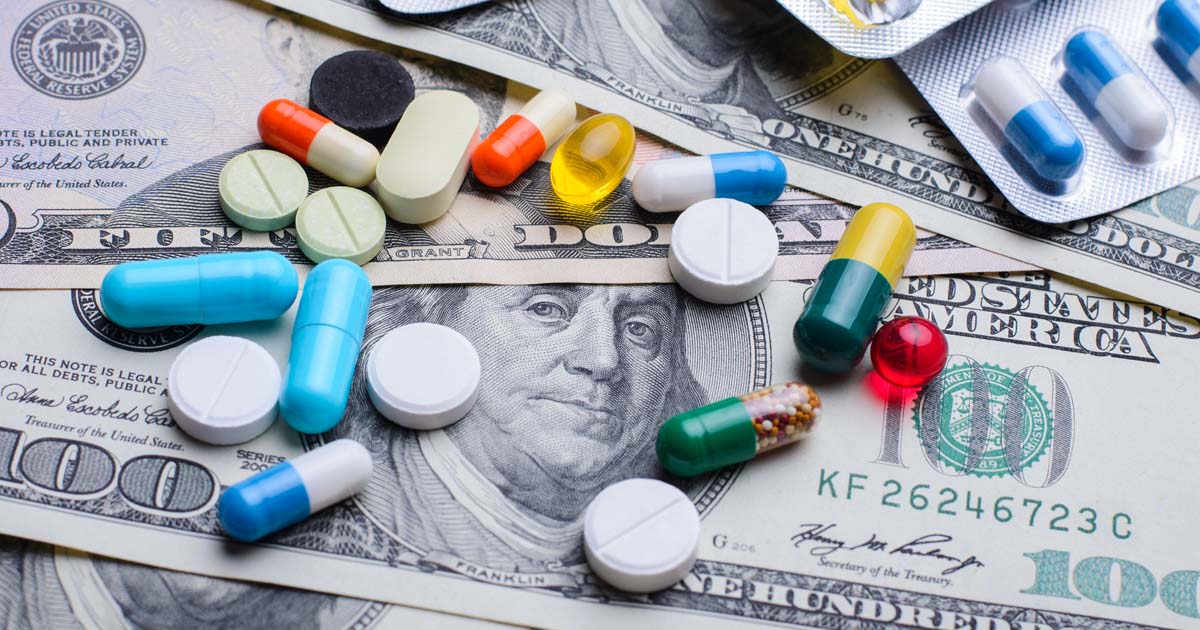
Even with everything else happening in society, it’s hard to overstate how deadly the opioid addiction crisis continues to be for Americans. While the gun violence epidemic claimed the lives of more than 44,300 Americans last year, and roughly 42,000 Americans died in automobile accidents, the Commonwealth Fund estimates that, in just the first nine months of 2022, opioids – particularly synthetic opioids like fentanyl – killed nearly 80,000 Americans. For perspective, that’s almost 30,000 more American deaths than the entire Vietnam War over almost 20 years.
But unlike public health threats like the Covid-19 pandemic or gun violence, which can’t be attributed to any singular responsible individual or entity, the opioid epidemic can be traced back to one common enemy: The pharmaceutical industry. It’s not inaccurate to state that Big Pharma, along with its army of lobbyists that have infiltrated federal regulatory agencies like the Food and Drug Administration (FDA), unleashed the horror of the opioid epidemic on America and has so far faced almost no accountability.
Almost all of us have a direct or secondary connection to someone who has tragically lost a family member or friend to the opioid addiction crisis that’s dragged on for decades. The party that can manage to turn the 2024 election into a reckoning for Big Pharma will win not only the presidency, but will likely control both houses of Congress and be in a great position to loosen Big Pharma’s grasp on our government and its institutions.
How Big Pharma took over the FDA and unleashed the opioid crisis
The opioid crisis began with an aggressive lobbying campaign (PDF link) by Purdue Pharma, makers of the highly addictive painkiller OxyContin. While OxyContin was approved in 1995 for short-term use, Purdue successfully pushed the FDA to approve it for a wide range of pain relief in 2001, opening the floodgates for doctors everywhere to prescribe it to patients with moderate to severe pain levels requiring “a continuous round-the-clock analgesic for an extended period of time.”
Former FDA commissioner Dr. David Kessler, who oversaw the original approval in 1995, told 60 Minutes in 2019 that the new rules the FDA issued allowed OxyContin to be marketed to a much larger audience. He added that the agency employed just five people to regulate pharmaceutical marketing. Former drug manufacturer Ed Thompson also told CBS that his former industry stood to make a huge profit from the new rule, saying it “determines whether somebody can make $10 million or a billion dollars.”
“You have a system of pharmaceutical promotion that changed the way medicine practiced, and no one stopped it,” Dr. Kessler said.
Not long after OxyContin’s initial foray into the market in 1997, pharmacy benefit manager Merck Medco warned doctors about the addictive nature of OxyContin and cautioned them against over-prescribing it. The billionaire Sackler family, which has 100% control of Purdue Pharma, mounted a counter-offensive, making arguments about the drug’s safety that they knew to be false. In 2022, medical journal The Lancet issued a blistering report delving into how Big Pharma’s insatiable greed led to thousands of deaths from OxyContin overdose, another wave of deaths from the heroin addiction crisis, and a third wave of deaths from synthetic opioids like fentanyl. Harvard University public health professor Howard Koh stressed that the corruption of regulatory agencies like the FDA was a catalyst for the opioid crisis spiraling out of control:
Post-approval, it’s usually left up to industry—not regulators—to educate and advise prescribers on how to evaluate and mitigate risk. Donations from opioid manufacturers to politicians continue to influence policy decisions. In addition, a revolving door of officials leaving government regulatory agencies such as the Drug Enforcement Agency regularly join the pharmaceutical industry with little to no “cooling off” periods. The report details these and other glaring examples.
Purdue eventually pleaded guilty to misbranding OxyContin in 2007 and paid $600 million in civil penalties. And in 2022, the Sacklers settled with nine state attorneys general suing them over the opioid crisis to the tune of $6 billion. However, this was a drop in the bucket: The Sacklers went on to make almost $13 billion in profit from OxyContin, and none of them have yet to see the inside of a prison cell.
Anti-Pharma populism wins consistently at the ballot box
Pharma’s popularity swung wildly between 2019 and 2021. Before the Covid-19 pandemic, Gallup found pharma was the most reviled industry in America with 58% disapproval. The disapproval of pharma dropped to just 31% two years later after the industry rolled out three different Covid-19 vaccines that allowed society to reopen. But Presidents Trump and Biden have both scored points by dunking on Big Pharma, with the Trump administration rolling out two separate rules on drug price transparency at the end of his term, and Biden pushing to lower drug prices in his Build Back Better legislation that ultimately failed to pass Congress.
Beyond just Purdue Pharma and the Sackler family, the entire pharmaceutical industry is known for playing with large sums of money to influence public policy. According to OpenSecrets’ campaign finance database, pharma has contributed a roughly even amount to both Democrats and Republicans, spending more than $318 million in federal races since 1990. Pharma’s return on investment becomes apparent when looking at the largest recipients of their campaign contributions, like former Congressman Kurt Schrader (D-Oregon).
The New Republic referred to Schrader as “Big Pharma’s favorite democrat” in an article about his unsuccessful reelection bid in the 2022 midterms. This moniker is fitting, given that Schrader received more than $740,000 in donations from Big Pharma since 2007.
For most of his time in Congress, [Schrader] made his mark chiefly as a shameless friend of Big Pharma. Last year, he was the key leader who helped kill prescription drug pricing legislation—a key part of Biden’s Build Back Better agenda—in committee. And during that debate he carved out time to fundraise near Congress with members of the pharmaceutical industry.
Schrader didn’t even make it to the general election, losing in the primary to Jamie McLeod-Skinner, a more progressive opponent, who in turn lost to a Republican in November. It could be argued that voters of Oregon’s 5th Congressional District – which was held by Democrats for 25 years – could have hated their pharma-friendly Congressman so much that they not only voted him out, but switched parties. It could also be just as likely that the redistricting of OR-5, in which the state capital of Salem was cut out and replaced with the more rural community of Bend, changed the electorate enough to make it competitive enough for a Republican to win.
A conservative Southern California district can perhaps provide a clearer case of how anti-pharma populism scores with swing voters. Rep. Katie Porter (D-California), who was first elected in the 2018 midterms (in which healthcare was the #1 issue among voters), was the first-ever Democrat to represent California’s 45th Congressional District in conservative Orange County. And despite House Democrats losing ground in the 2020 election, all Democrats who backed Medicare for All – even in swing districts like Porter’s – prevailed. Rather, the House Democrats who lost their races were more friendly to the for-profit healthcare system.
Porter has expertly used her Congressional bully pulpit to expose Big Pharma’s greed to a mass audience on numerous occasions. In 2021, Porter confronted Abbvie CEO Richard Gonzalez on his company spending billions on stock buybacks – which drive up the value of stocks that executives are often compensated with in lieu of higher-taxed salaries – rather than on research and development to improve outcomes for his company’s medications.
In 2020, Porter grilled former Celgene CEO Mark Alles on his company’s nearly two dozen price hikes on Revlimid, a drug developed with $3.3 billion in taxpayer dollars that’s used to treat cancer patients. As Porter used her whiteboard to illustrate, Celgene raised the price of Revlimid from $215 per pill in 2005, to $763 per pill (more than $16,000 per month of treatment) under Alles’ tenure.
According to a Congressional investigation, the price hikes on Revlimid were done explicitly to meet the company’s revenue goals, rather than on increased research and development costs. Porter also pointed out that Alles’ $13 million annual compensation package was dependent on meeting these revenue goals, meaning the price hikes benefited him personally:
PORTER: “Of that $13 million, about $2.1 million came from your company hitting yearly earning targets, and more than half of the bonus formula was based on hitting those targets. Any increase in the price of Revlimid would also increase your bonus by increasing earnings. Isn’t that right, Mr. Alles?
ALLES: “If revenues increased and expenses did not, then earnings would be enhanced and–”
PORTER. “--Thank you. Mr. Alles, in fact, the Oversight Committee found that if you hadn’t increased the price of Revlimid, you wouldn’t have gotten your bonus. Mr. Alles, do you know how much you personally received in bonuses over two years, over the last two years, just because Celgene raised the price of this one drug, Revlimid?”
ALLES: “I receive very generous compensation but I don’t know the exact number that you’re referring to.”
PORTER: “In fact, you personally received half a million dollars, personally, just by tripling the price of Revlimid. So to recap here, the drug didn’t get any better, the cancer patients didn’t get any better, you just got better at making money. You just refined your skills at price gouging. And to be clear, taxpayers spent $3.3 billion on Revlimid. Medicare. $3.3 billion… If the price of Revlimid had only been increased to reflect inflation, the cost would only be about 286 dollars today, according to the Fed’s inflation calculator. 286 dollars per pill.”
Katie Porter’s success in a predominantly Republican district in both 2018 and 2020 could be attributed to her populist record, particularly against pharmaceutical companies (she was eventually redistricted to the more Democrat-friendly 47th Congressional District in 2022).
It remains to be seen how Porter will fare in the primary for California’s US Senate race, which will be vacated by retiring incumbent Dianne Feinstein, but her populist record will undoubtedly serve her well in 2024. And if current polling bears out, this coming presidential election will likely feature two nominees who have loudly criticized Big Pharma’s greed in Joe Biden and Donald Trump.
It’s clear at this point that the 2024 election could very well hinge on which party can capture the populist mantle on Big Pharma. If the Katie Porter wing of the party wins the day, it could make a difference in swing states like Arizona, Georgia, Pennsylvania, and Wisconsin. But if the Kurt Schrader wing of the Democratic Party prevails, it could very cost Democrats both the presidency and down-ballot races.
Carl Gibson is a freelance journalist and columnist whose work has been published in CNN, The Guardian, The Washington Post, The Houston Chronicle, Barron’s, Business Insider, The Independent, and NPR, among others.

















